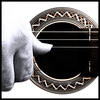Practising an instrument is very much like bodybuilding, isn't it? An exceedingly physical act that involves warmup, stretching, muscles, tendons, stamina, endurance, agility, etc. All those things related to moving your body and getting stronger. The physical aspect of playing the guitar is undeniable, sure… But the mental aspect of it should not be overlooked. Actually, many will argue that practising is predominantly an activity of the mind rather than the body. Neurologists say that learning is the process by which new neural connections occur in the brain and through practise these connections strengthen and thicken, so to speak. Every time you practise, the brain will add a new strand to the existing group of connections pertaining to the piece you are working on and the physical representation of the piece in your brain will thicken and become more permanent. They also say that the brain doesn't know the difference between the "real" and the "imagined" input. In other words, it doesn't matter whether you are playing the piece with your hands or in your mind - your mind will not know the difference and treat either as actual practice. There are several controlled experiments all over the world carried out with music students to prove this point. Students are asked to decipher a piece and then practise it for a certain period of time without touching the instrument. Then their progress is compared to the one displayed by the students who did the same amount of practice on the instrument. The results are quite exciting. Looks like, practising in your mind is equally and at times even more effective than its physical counterpart.
Why did I develop an interest in this? I did not play guitar for an extended period of time. I didn't have time or energy. Life got in the way. But, one thing that I never gave up doing was playing guitar in my mind - pretty much all the time! Then whenever I picked up my instrument just to noodle on it bit to relax I was quite surprised to see that I was still able to play - some pieces even better than when I actually practised them. I didn't know why this was at the time. Just assumed that I was lucky or that I practised really well when I learned them. Now I think it was due to my constant mental practise. In this context, I highly recommend this book titled The Brain That Changes Itself by Norman Doidge. Excellent treatise about neuroplasticity - how you can change your physical brain simply by thinking about it.
These days probably 60% of my practice takes place completely in my head. Meaning, once I've deciphered the piece I'm working on, I set aside time to practise it in my imagination, visualizing my hands, fingers while hearing the music in my mind. Make no mistake, mental practice is not easy. It is not just playing the melody haphazardly in your head. You need to make an effort to imagine yourself on the instrument performing the piece feeling every single note, every single position - left hand, right hand alike. You have to go over difficult passages repeatedly, play some parts slowly just like physical practice. It's surprisingly effective! Also, you don't have to worry about straining your fingers, disturbing the neighbours, wearing out the strings, and you can pick the fanciest, the most expensive guitar you wish to play on. Give it a try...
Why did I develop an interest in this? I did not play guitar for an extended period of time. I didn't have time or energy. Life got in the way. But, one thing that I never gave up doing was playing guitar in my mind - pretty much all the time! Then whenever I picked up my instrument just to noodle on it bit to relax I was quite surprised to see that I was still able to play - some pieces even better than when I actually practised them. I didn't know why this was at the time. Just assumed that I was lucky or that I practised really well when I learned them. Now I think it was due to my constant mental practise. In this context, I highly recommend this book titled The Brain That Changes Itself by Norman Doidge. Excellent treatise about neuroplasticity - how you can change your physical brain simply by thinking about it.
These days probably 60% of my practice takes place completely in my head. Meaning, once I've deciphered the piece I'm working on, I set aside time to practise it in my imagination, visualizing my hands, fingers while hearing the music in my mind. Make no mistake, mental practice is not easy. It is not just playing the melody haphazardly in your head. You need to make an effort to imagine yourself on the instrument performing the piece feeling every single note, every single position - left hand, right hand alike. You have to go over difficult passages repeatedly, play some parts slowly just like physical practice. It's surprisingly effective! Also, you don't have to worry about straining your fingers, disturbing the neighbours, wearing out the strings, and you can pick the fanciest, the most expensive guitar you wish to play on. Give it a try...

 RSS Feed
RSS Feed